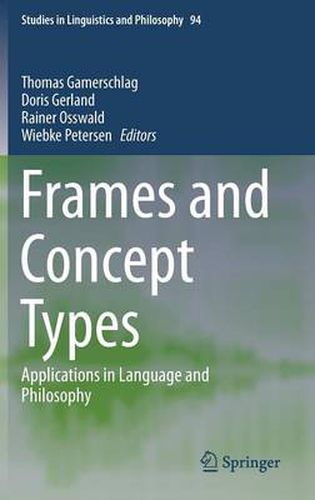Readings Newsletter
Become a Readings Member to make your shopping experience even easier.
Sign in or sign up for free!
You’re not far away from qualifying for FREE standard shipping within Australia
You’ve qualified for FREE standard shipping within Australia
The cart is loading…






This title is printed to order. This book may have been self-published. If so, we cannot guarantee the quality of the content. In the main most books will have gone through the editing process however some may not. We therefore suggest that you be aware of this before ordering this book. If in doubt check either the author or publisher’s details as we are unable to accept any returns unless they are faulty. Please contact us if you have any questions.
This volume showcases the potential richness of frame representations. The presentation includes introductory articles on the application of frames to linguistics and philosophy of science, offering readers the tools to conduct the interdisciplinary investigation of concepts that frames allow.
* Introductory articles on the application of frames to linguistics and philosophy of science
* Frame analysis of changes in scientific concepts
* Event frames and lexical decomposition
* Properties, frame attributes and adjectives
* Frames in concept composition
* Nominal concept types and determination
This volume deals with frame representations and their relations to concept types in linguistics and philosophy of science. It aims at reviving concepts and frames as a common model across disciplines for representing semantic and conceptual knowledge. Departing from the general assumption that frames are not just an arbitrary format of representation but essential to human cognition, a number of case studies apply frames as an analytical tool to a wide range of phenomena, from changes in scientific concepts to particular linguistic phenomena. This provides new insights into long-standing semantic issues, such as the lexical representation of verbs (as predicative frames specifying particular event descriptions or situation types and their participants), adjectives and nominals (as concept frames, which provide attributes and properties of an entity), as well as modification, complementation, possessive constructions, compounding, nominal concept types, determination, or definiteness marking. Bert Gehrke, Pompeu, Fabra University, Barcelona, Spain
$9.00 standard shipping within Australia
FREE standard shipping within Australia for orders over $100.00
Express & International shipping calculated at checkout
This title is printed to order. This book may have been self-published. If so, we cannot guarantee the quality of the content. In the main most books will have gone through the editing process however some may not. We therefore suggest that you be aware of this before ordering this book. If in doubt check either the author or publisher’s details as we are unable to accept any returns unless they are faulty. Please contact us if you have any questions.
This volume showcases the potential richness of frame representations. The presentation includes introductory articles on the application of frames to linguistics and philosophy of science, offering readers the tools to conduct the interdisciplinary investigation of concepts that frames allow.
* Introductory articles on the application of frames to linguistics and philosophy of science
* Frame analysis of changes in scientific concepts
* Event frames and lexical decomposition
* Properties, frame attributes and adjectives
* Frames in concept composition
* Nominal concept types and determination
This volume deals with frame representations and their relations to concept types in linguistics and philosophy of science. It aims at reviving concepts and frames as a common model across disciplines for representing semantic and conceptual knowledge. Departing from the general assumption that frames are not just an arbitrary format of representation but essential to human cognition, a number of case studies apply frames as an analytical tool to a wide range of phenomena, from changes in scientific concepts to particular linguistic phenomena. This provides new insights into long-standing semantic issues, such as the lexical representation of verbs (as predicative frames specifying particular event descriptions or situation types and their participants), adjectives and nominals (as concept frames, which provide attributes and properties of an entity), as well as modification, complementation, possessive constructions, compounding, nominal concept types, determination, or definiteness marking. Bert Gehrke, Pompeu, Fabra University, Barcelona, Spain